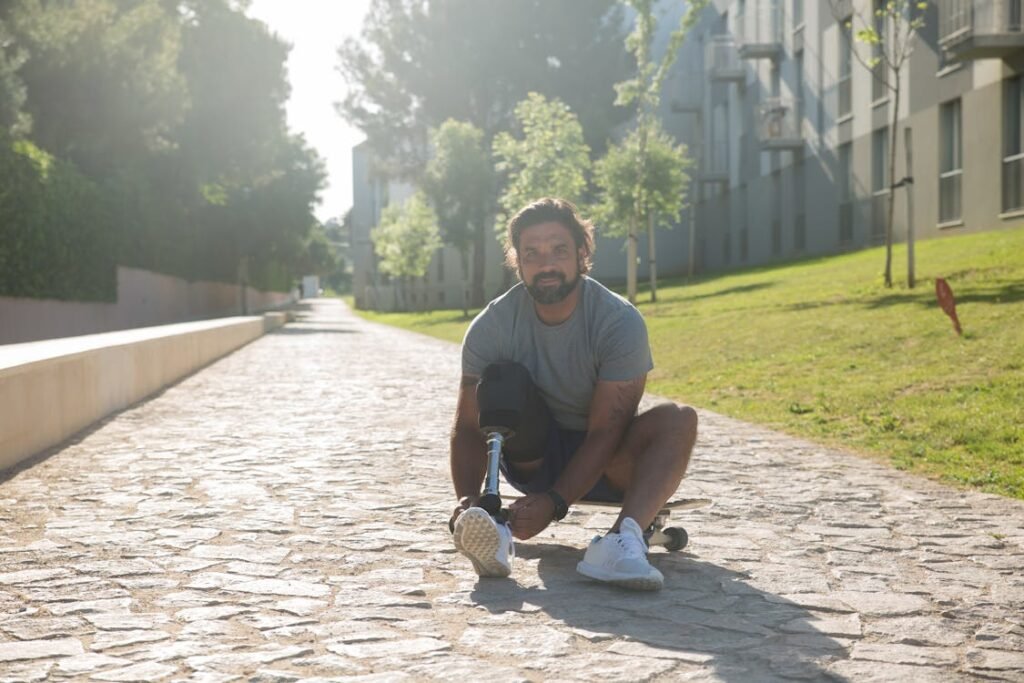Losing a limb is more than a physical event—it’s an emotional shock. Even when the surgery is planned, even when there’s time to prepare, the psychological impact often hits harder than expected. Many people don’t talk about it, but depression after amputation is real, and it affects thousands of individuals in India and around the world.
At Robobionics, we’ve worked closely with amputees of all ages. We’ve seen what silence can do. We’ve also seen how one powerful step—fitting a prosthesis early—can make a world of difference not just for the body, but for the mind. This article explores the connection between post-amputation depression and early prosthetic fitting. We’ll walk you through how mobility and mental health are deeply connected, and why taking action early can help someone reclaim their identity, confidence, and hope.
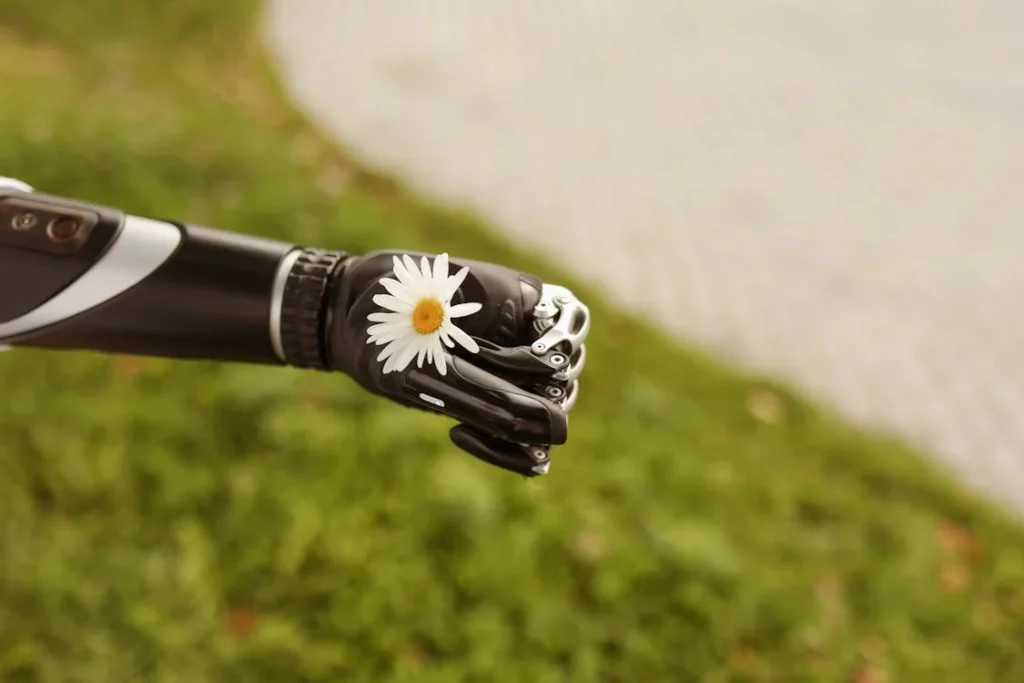
Understanding Post-Amputation Depression
The Emotional Wounds That Don’t Show on Scans
When someone wakes up after an amputation, the first few moments are often filled with confusion. Even if they knew it was coming, the reality of what’s gone takes time to register.
Over the next few days or weeks, the full emotional impact begins to unfold. What follows isn’t just sadness—it’s often a wave of grief, fear, and loss of self-worth. That wave is what we call post-amputation depression.
Unlike a visible wound, this kind of depression is hidden. It doesn’t always show in behavior right away. Some patients become quiet. Others try to put on a brave face.
Many don’t talk about it at all. But inside, they’re mourning. Mourning the limb, the life they had, the routines they could no longer follow, and the future they’re now uncertain about.
The fear of being dependent on others weighs heavily. Some patients worry they won’t be able to return to work. Others wonder if their relationships will change.
Simple things like taking a shower or going outside suddenly feel like enormous tasks. And without proper emotional support, this burden grows heavier each day.
In India, the emotional aspect of amputation is often not discussed enough. There’s still a stigma around mental health. Patients may be told to “stay strong” or “adjust with time.”
While these words are meant kindly, they often prevent real healing. Depression doesn’t go away by ignoring it—it fades when we meet it with understanding, movement, and hope.
It’s important to know that post-amputation depression isn’t just about sadness. It can include fatigue, lack of motivation, sleep problems, irritability, or even withdrawal from friends and family.
It changes the way someone sees themselves and their future. That’s why it’s critical to address it early—before it becomes overwhelming.
So how do we begin to heal this invisible pain? Surprisingly, one of the most effective tools is not only found in therapy or medication. It’s found in mobility.
It’s found in regaining the ability to move, to stand, and to walk forward—literally and emotionally. That’s where early prosthetic fitting steps in. It becomes more than a medical device—it becomes a key to emotional recovery.
The Psychology of Movement and Control
Why Getting Up and Moving Early Lifts the Mind
There’s something powerful that happens when a person who has lost a limb is able to stand again. Not with assistance. Not in a wheelchair. But with their own body, on their own legs—or with the help of a prosthetic arm—taking control back.
That moment of movement, even if it’s just a few steps or lifting a cup, is more than physical. It’s a mental breakthrough.
After amputation, people often feel like they’ve lost control. Their body feels unfamiliar. Their routines are shattered. Their confidence takes a hit.
This feeling of helplessness is a breeding ground for depression. But when someone is fitted with a prosthesis early, they start to take that control back piece by piece.
Early mobility changes the story in the patient’s mind. Instead of saying, “I can’t,” the brain starts to believe, “Maybe I can.” That shift in thinking is where healing begins.
Even simple movements make a difference. Standing for a few minutes each day with a preparatory prosthesis activates muscles, stimulates blood flow, and reawakens parts of the body and brain that had gone quiet.
As strength returns, so does purpose. It’s not just about learning how to walk again—it’s about reconnecting with life.
When a prosthesis is introduced early, the patient starts to feel whole again. There’s less time spent lying in bed thinking about what’s missing. There’s more time spent adapting, exploring, and participating.
And participation is the enemy of depression. It pulls the person out of isolation and into the rhythm of daily life.
What’s also important is how early movement affects self-image. Depression often distorts the way we see ourselves. People may feel broken, damaged, or less valuable.
But when they look in the mirror and see themselves upright, mobile, and capable, that image starts to shift. They don’t see a disability—they see possibility.
At Robobionics, we’ve seen this time and time again. Patients who were withdrawn and quiet during their hospital stay light up the day they take their first steps with a prosthesis.
Their voice changes. Their posture changes. Their eyes light up. That’s not a coincidence. It’s the psychological impact of movement—and it’s one of the strongest natural therapies available.
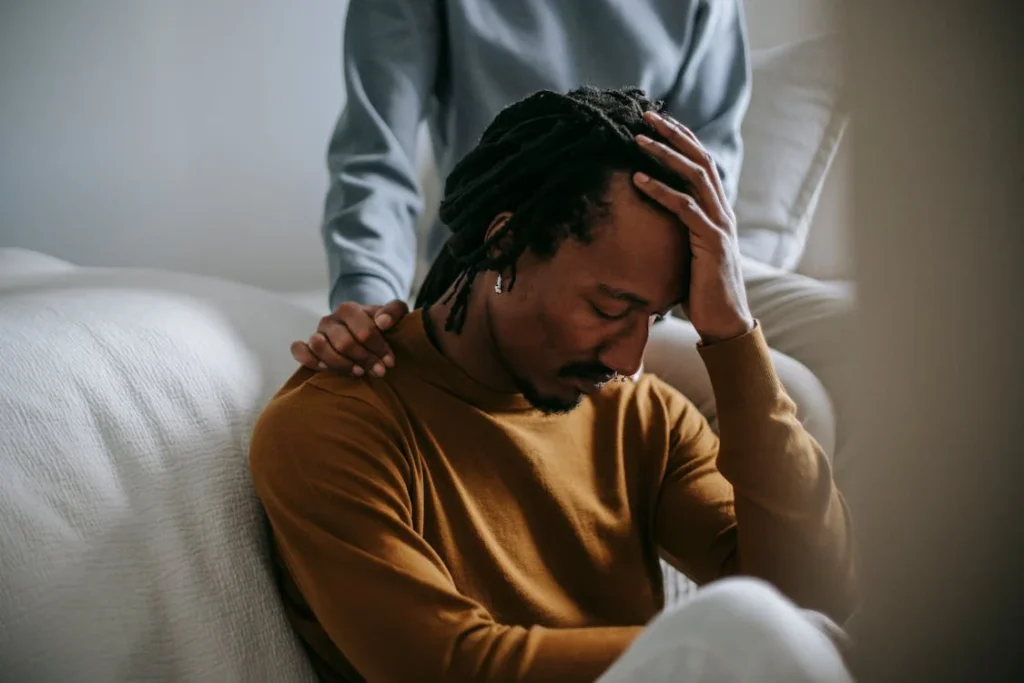
How Early Fitting Encourages Faster Emotional Recovery
The Sooner You Move, the Sooner You Heal Inside
Depression thrives in the absence of progress. When each day looks the same—lying in bed, feeling discomfort, waiting for the next step—it’s easy to feel stuck.
Time feels slow. The future feels blurry. This is especially true after amputation, when patients are waiting for wounds to heal and instructions on what happens next. That waiting period can be dangerous—not just physically, but emotionally.
But when early prosthetic fitting is introduced—often within weeks of surgery under medical supervision—it interrupts that cycle. Suddenly, there’s something to look forward to. Something tangible. A plan. And most importantly, a sense of progress.
The earlier the fitting, the earlier the patient begins to engage with rehabilitation. That means more movement, better muscle strength, and a greater sense of independence. These physical changes feed directly into emotional wellbeing.
The patient feels stronger, more capable, and less like a patient. They start setting goals—walk to the bathroom, stand for 10 minutes, take three steps without help. Each goal achieved is a mental victory, and these small wins add up quickly.
Early fitting also reduces the chances of falling into a cycle of self-pity or helplessness. The longer someone stays inactive, the harder it becomes to get motivated.
Muscles weaken. Confidence drops. The task ahead feels bigger. But when someone is moving early, the mountain doesn’t feel as steep. Every step forward becomes proof that healing is happening.
In many cases, early mobility helps prevent secondary depression caused by physical complications. Without early movement, issues like muscle atrophy, contractures, and chronic pain can arise.
These complications then worsen the mental load, making recovery feel harder. But when a prosthetic is fitted early and the body starts working again, these risks are reduced, and the patient is less likely to feel trapped in a cycle of suffering.
There’s also a social benefit. When people move earlier, they interact earlier. They join family meals again. They go outside for fresh air. They laugh more. Depression often isolates people, but movement reconnects them.
It opens the door to community, routine, and joy. These human connections are just as critical to healing as any therapy or medicine.
The takeaway is clear: early fitting isn’t just about walking. It’s about lifting the mind. It’s about creating momentum, building resilience, and reminding the person that life isn’t over—it’s just changing.
Rebuilding Identity Through Early Prosthesis Use
How Movement Helps a Person Feel Like Themselves Again
After an amputation, it’s common for a person to question their identity. Who am I now? What can I still do? Will people see me differently? These aren’t small questions.
They sit in the mind constantly, especially in the quiet moments after surgery. And they often lead to a deep emotional disconnect—from the self, from the body, and from the world.
The feeling of “being yourself” often starts with doing the things you used to do. For some, that’s walking down the street. For others, it’s brushing their hair or holding a cup.
These simple, everyday actions carry emotional weight. They make a person feel real, normal, and whole again.
But these actions can feel impossible right after an amputation—until the prosthesis enters the picture. That’s why early fitting is so powerful. The sooner a person begins using a prosthesis, the sooner they begin reconnecting with their own sense of self.
The psychological effect of wearing a prosthesis—especially when introduced early—is like handing someone back a piece of their identity.
The prosthetic becomes more than a tool. It becomes part of their story. It gives them a sense of direction. It says, “Yes, you’ve been through something difficult. But you’re still you. You’re still here. And you’re still moving.”
At Robobionics, we often talk with patients about this exact moment. The moment when a person first stands or walks again after fitting. You can see it in their posture. In their voice.
In their eyes. Something shifts. That shift is a reclaiming of identity. They realize, “I’m not defined by my loss—I’m defined by what I do next.”
The longer someone goes without fitting, the more disconnected they often feel from their body. The mind gets used to seeing the absence. The body feels unfamiliar.
But when a prosthesis is introduced early, that mental distance doesn’t grow. Instead, the person begins to form a new, positive relationship with their body. They accept the change—not as something broken, but as something adaptable.
Rebuilding identity isn’t about erasing what happened. It’s about moving forward with dignity. Early prosthetic fitting makes that possible—by turning recovery from a passive waiting game into an active journey of rediscovery.
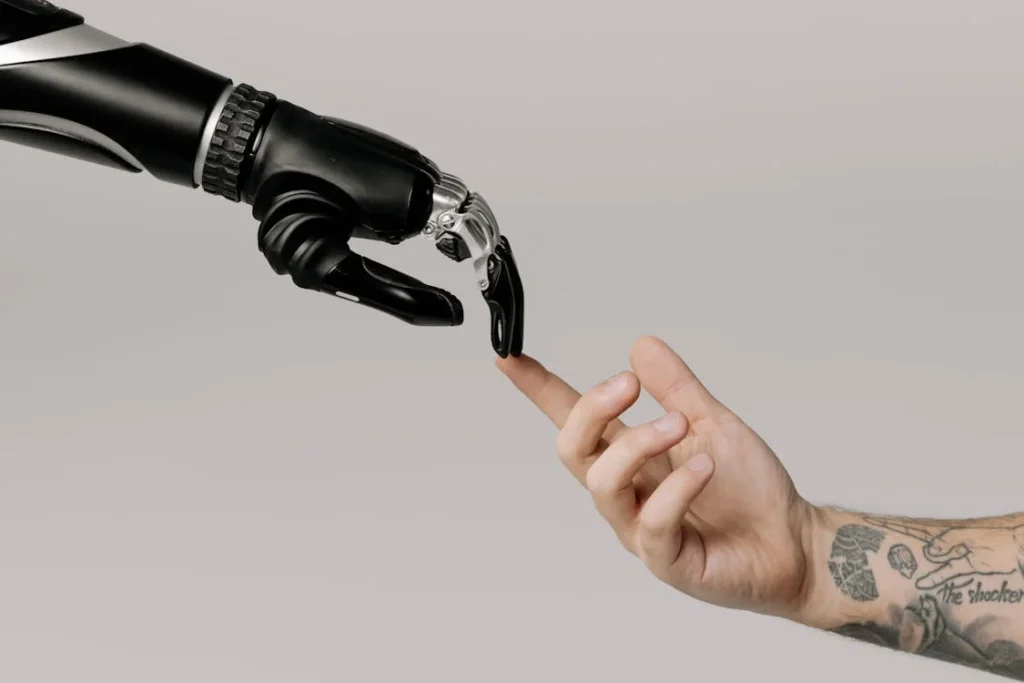
The Role of Independence in Mental Recovery
Why Doing Things for Yourself Restores Confidence
Depression often grows strongest where independence is lost. After an amputation, daily tasks can suddenly require help.
Whether it’s going to the bathroom, dressing, or getting out of bed—needing assistance for every action can chip away at a person’s sense of value. It’s not about pride. It’s about dignity.
When someone begins to regain control over their own routine, everything changes. Being able to walk to the kitchen, carry a glass of water, or tie their own shoes—these tasks may seem small, but they’re powerful.
They give the person back their space, their routine, and their self-respect.
That’s where early prosthetic fitting plays a crucial role. It shortens the time a person has to rely fully on others. It opens the door to movement and function much earlier. And with each act of independence, a piece of mental stability returns.
One of the most common things we hear from patients at Robobionics is: “I just want to be able to do things on my own again.” That desire is not just physical.
It’s emotional. People don’t want to feel like a burden to their family or caregivers. They want to contribute. They want to be seen as capable. And the sooner they are fitted with a prosthesis, the sooner that journey back to independence begins.
Independence also brings back choice. Instead of waiting for someone to help them up, the person can decide to get up when they want. That freedom of choice is what fuels motivation. Motivation drives action. And action fights depression.
We’ve seen patients who were hesitant and emotionally shut down during the early days of recovery come alive once they began using their prosthesis. They made their own tea.
They went for short walks outside. They took pride in folding their laundry or helping cook a meal. These may not seem like big accomplishments—but in the world of recovery, they’re major milestones. Each act of independence builds emotional muscle.
When a prosthesis is fitted early, the person gets a head start on these wins. They spend less time feeling stuck and more time engaging with life. That engagement is what helps the brain and heart heal from trauma.
So if the goal is to recover fully—not just physically, but mentally—independence cannot wait. And early fitting is the bridge to making that independence a reality.
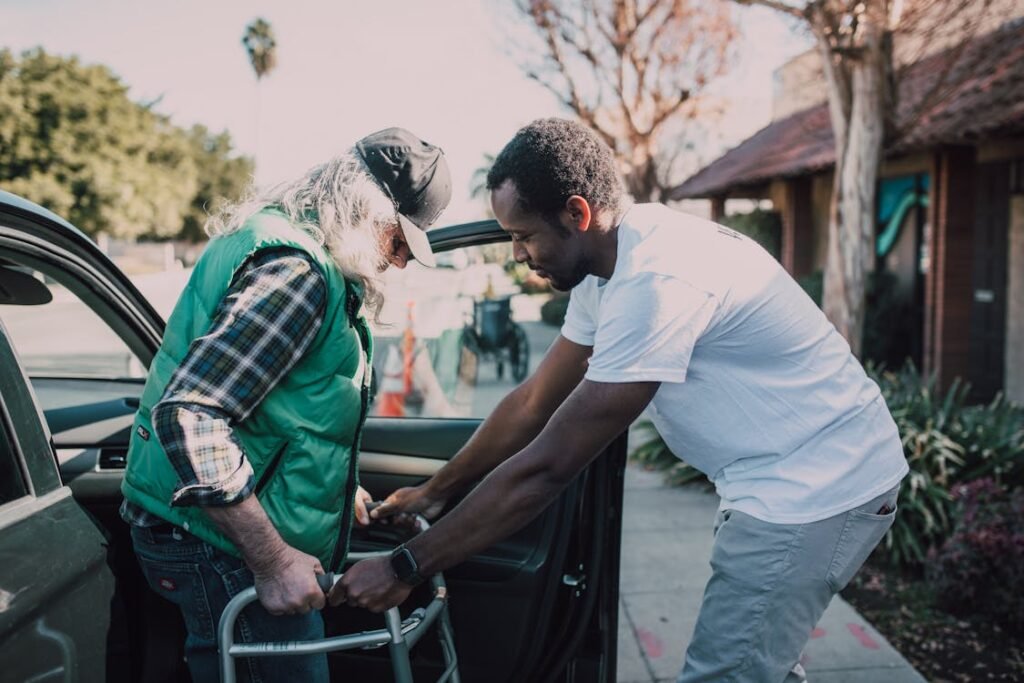
Family and Caregiver Confidence Through Early Progress
When the Patient Moves, Everyone Feels Hope Again
An amputation doesn’t affect just one person—it affects the whole family. Spouses, children, siblings, and parents often carry a heavy emotional load during the recovery process.
They worry. They feel helpless. They sometimes struggle with the new roles they must take on. And while they want to stay strong, the stress can slowly take its toll.
That’s why early prosthetic fitting helps not just the patient—but the entire support system. When a patient begins to move, stand, or walk with a prosthesis early, it changes the emotional tone of the household. There’s progress. There’s direction. There’s hope.
Families who were once consumed with worry start to feel relief. They see their loved one doing better. They see the spark return to their eyes. That sense of progress becomes a shared victory, and it strengthens the bond between everyone involved.
Caregivers in particular benefit from early fitting. When the person they’re supporting begins to do more on their own, it eases the daily burden.
It reduces the need for physical assistance, and it gives both people a bit more space and freedom. That breathing room is essential. It helps prevent caregiver burnout, which is a very real issue in long-term recovery scenarios.
At Robobionics, we’ve worked with many families who didn’t realize just how heavy their emotional load had become—until their loved one started using a prosthesis. Suddenly, the future didn’t look so uncertain.
Plans could be made again. Routines could return. There was laughter again. That shift happens because early fitting brings movement, and movement brings life back into focus.
There’s also the practical side. Early mobility allows patients to resume small family roles sooner. Maybe it’s helping a child with homework. Maybe it’s feeding a pet. These moments rebuild normalcy. They remind everyone that recovery isn’t about going back—it’s about moving forward, together.
For children who see a parent go through amputation, early movement is particularly powerful. Kids often don’t understand medical procedures or healing timelines.
But they do understand what it means to see their parent standing, walking, smiling. That image stays with them. It tells them everything is going to be okay.
Families don’t just want to see recovery. They want to feel it. And when prosthetic fitting happens early, that feeling arrives faster, stronger, and with lasting emotional impact.
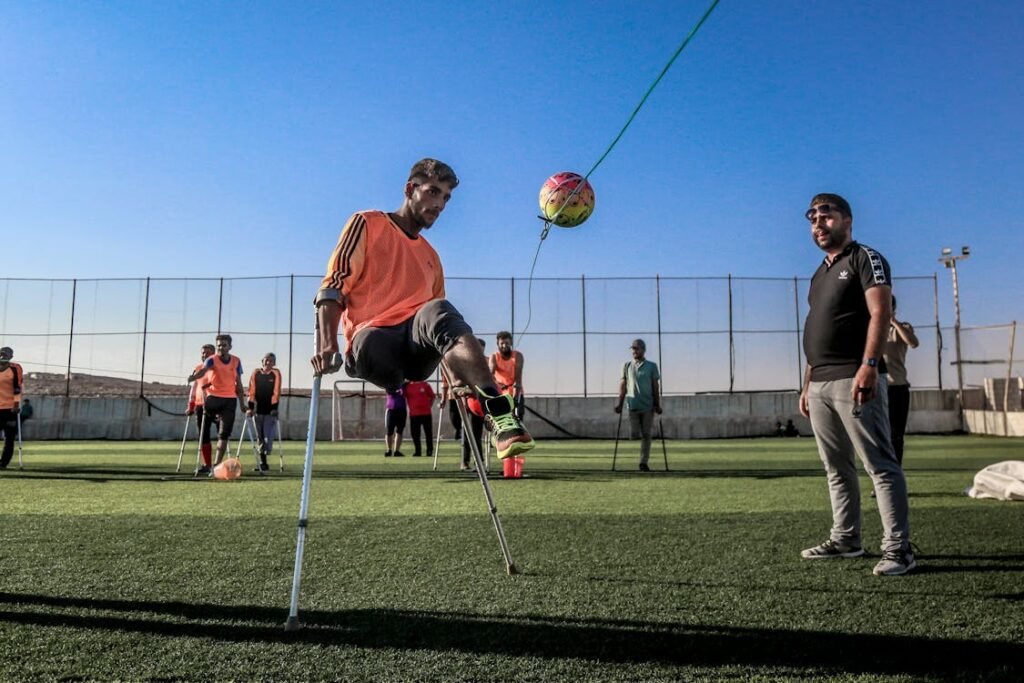
Real Stories of Emotional Healing Through Mobility
How Early Fitting Changed Lives—Inside and Out
In our work at Robobionics, we’ve met many incredible individuals who faced the darkest moments of their lives—and came out stronger because they took that first step with a prosthesis. Their stories are a reminder that recovery is never just about healing the body. It’s about lifting the spirit.
One patient, a young man in his late 20s, came to us after a road accident took his leg. He was physically stable, but emotionally defeated. He barely spoke. He avoided eye contact.
He had stopped answering calls from friends and refused visits from family. We fitted him with a preparatory prosthesis three weeks post-surgery. At first, he only used it for a few minutes a day.
But something shifted after that first fitting. He began asking questions. He wanted to try walking farther. Within two months, he had enrolled in a computer course.
Six months later, he returned to work. His depression didn’t vanish overnight—but the prosthesis gave him the tool to fight back.
Another story we often share is of a 50-year-old woman from Pune who lost her arm due to an infection. She was a homemaker and the emotional heart of her family. But after surgery, she became withdrawn and stopped doing the things she loved.
Early fitting of a functional upper limb prosthesis helped her start cooking again—one of her passions. It wasn’t about the food. It was about reclaiming her role in the family.
Her confidence returned. Her voice, once soft and uncertain, became lively again. Her prosthesis gave her more than a limb—it gave her emotional freedom.
These stories aren’t rare. They happen every time we fit someone early. The common thread? Progress leads to hope. And hope leads to healing.
Every patient is different. Every journey is personal. But the emotional impact of early mobility is universal. It brings back structure, choice, and belief. It brings back life.
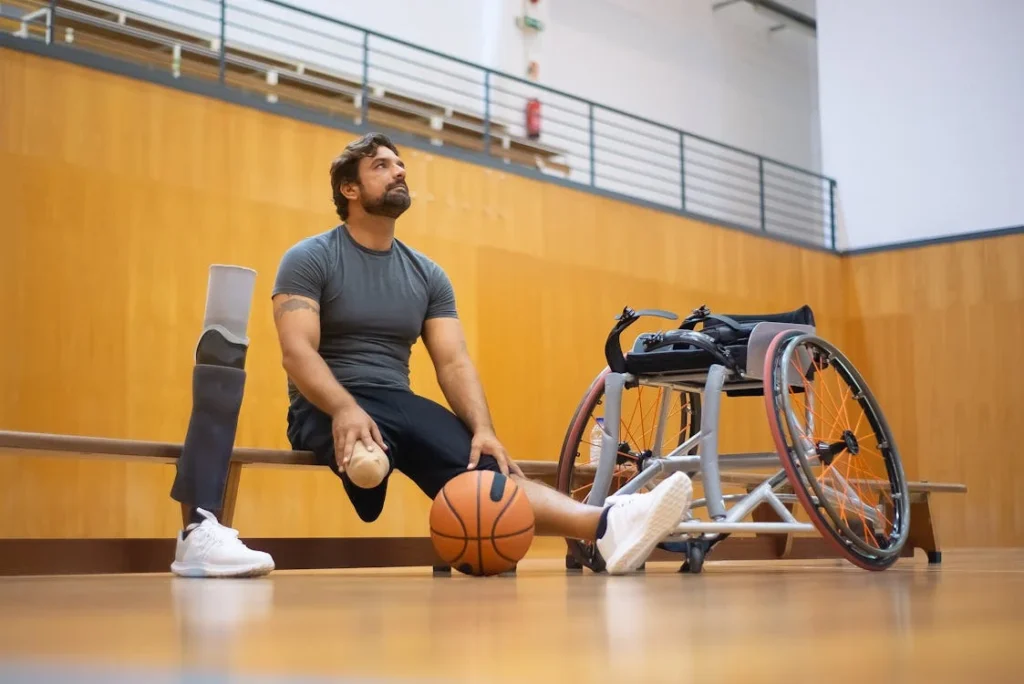
Conclusion
Depression after amputation is real, deep, and often misunderstood. But it isn’t permanent. It isn’t unbeatable. And most importantly—it isn’t untreatable. One of the most powerful tools for emotional recovery is movement. And the key to that movement is early prosthetic fitting.
When someone regains the ability to stand, walk, move, or hold something—something shifts in their mind. They go from seeing themselves as broken to seeing themselves as capable. They begin to believe again. And belief is the foundation of healing.
At Robobionics, we don’t just build prosthetics. We help rebuild lives. Every early fitting is a fresh start. A new chance. A moment of transformation. And if you or someone you love is facing the journey of recovery after amputation, know this: the sooner you take that step, the sooner you’ll start to feel whole again—not just in body, but in mind and heart.



